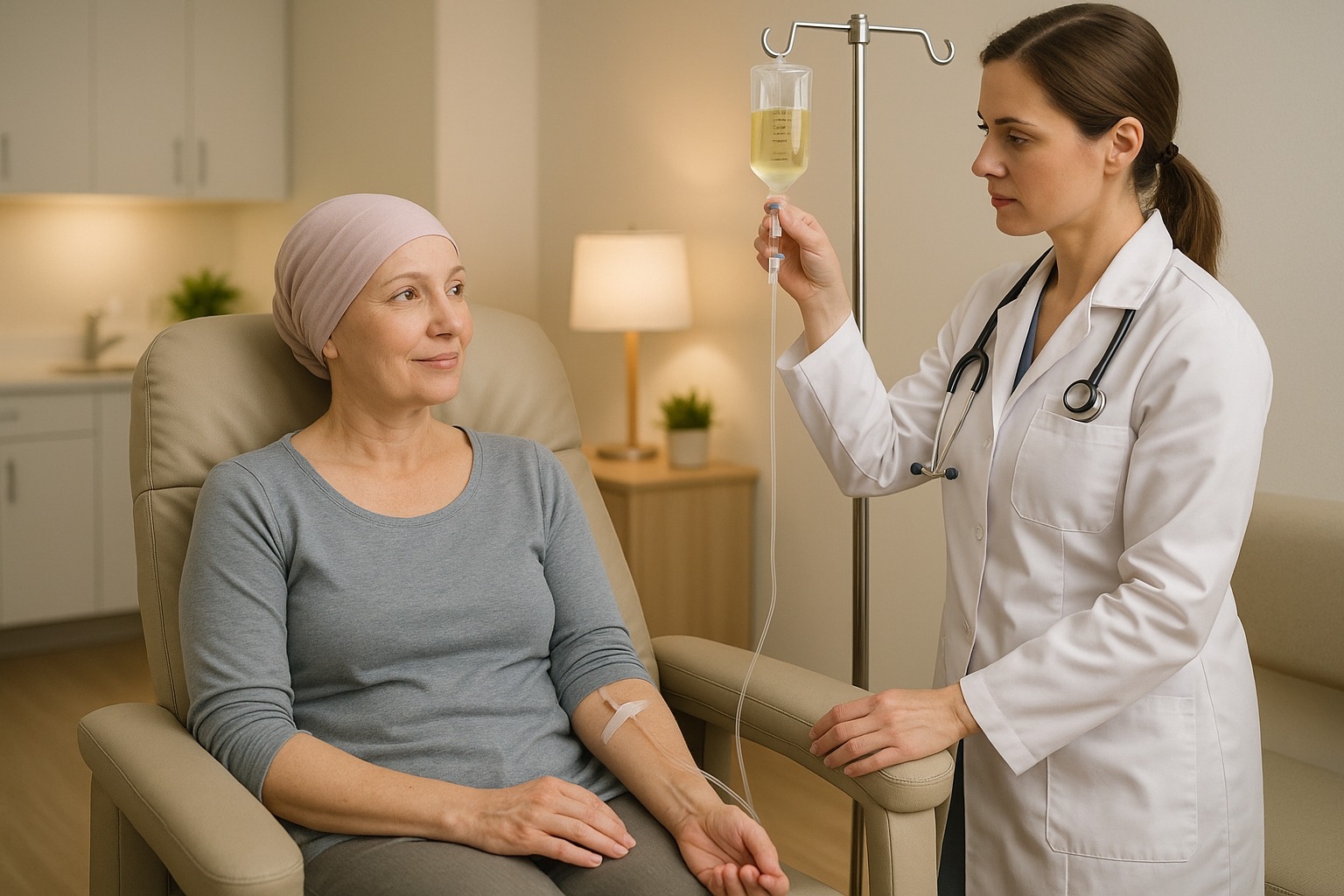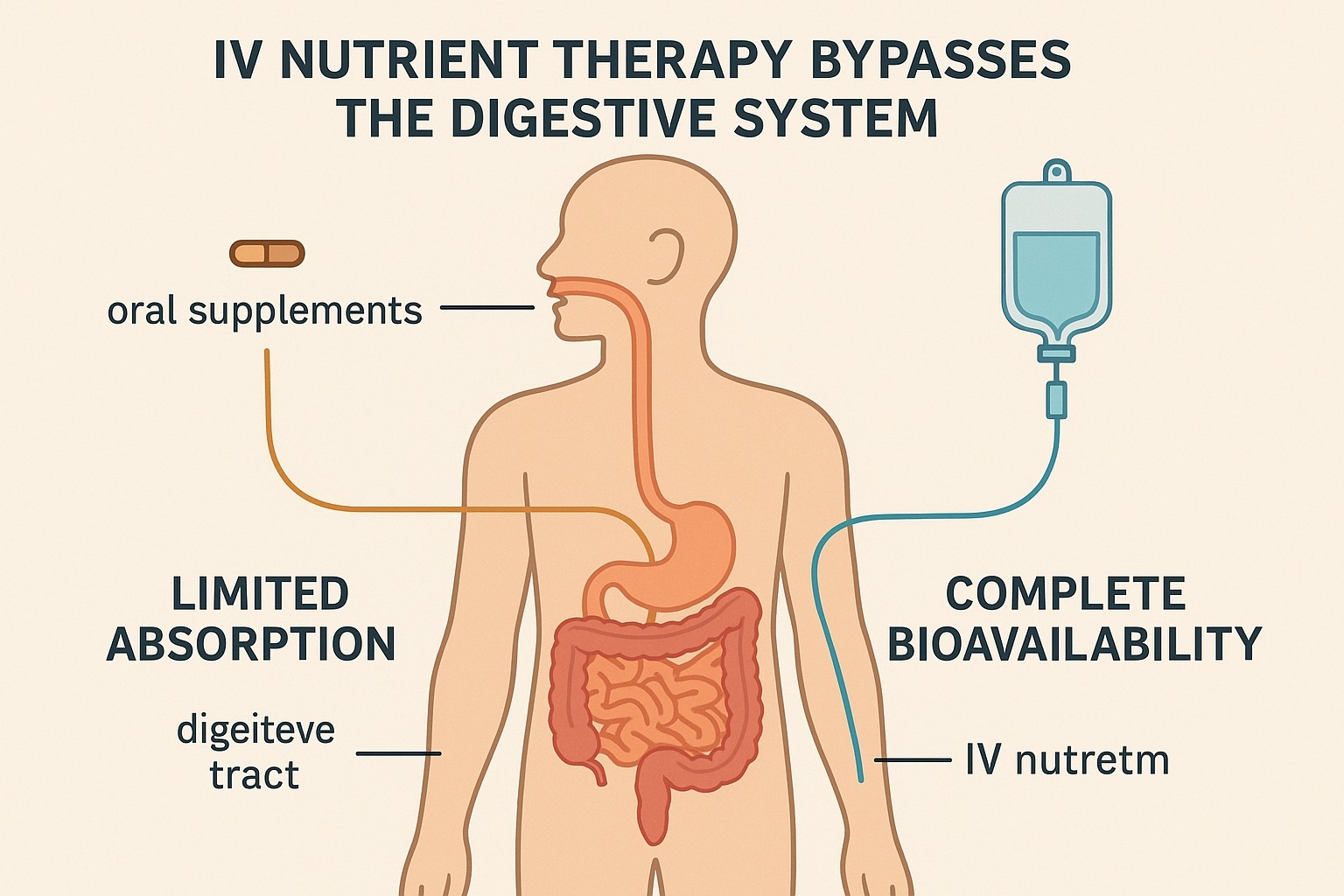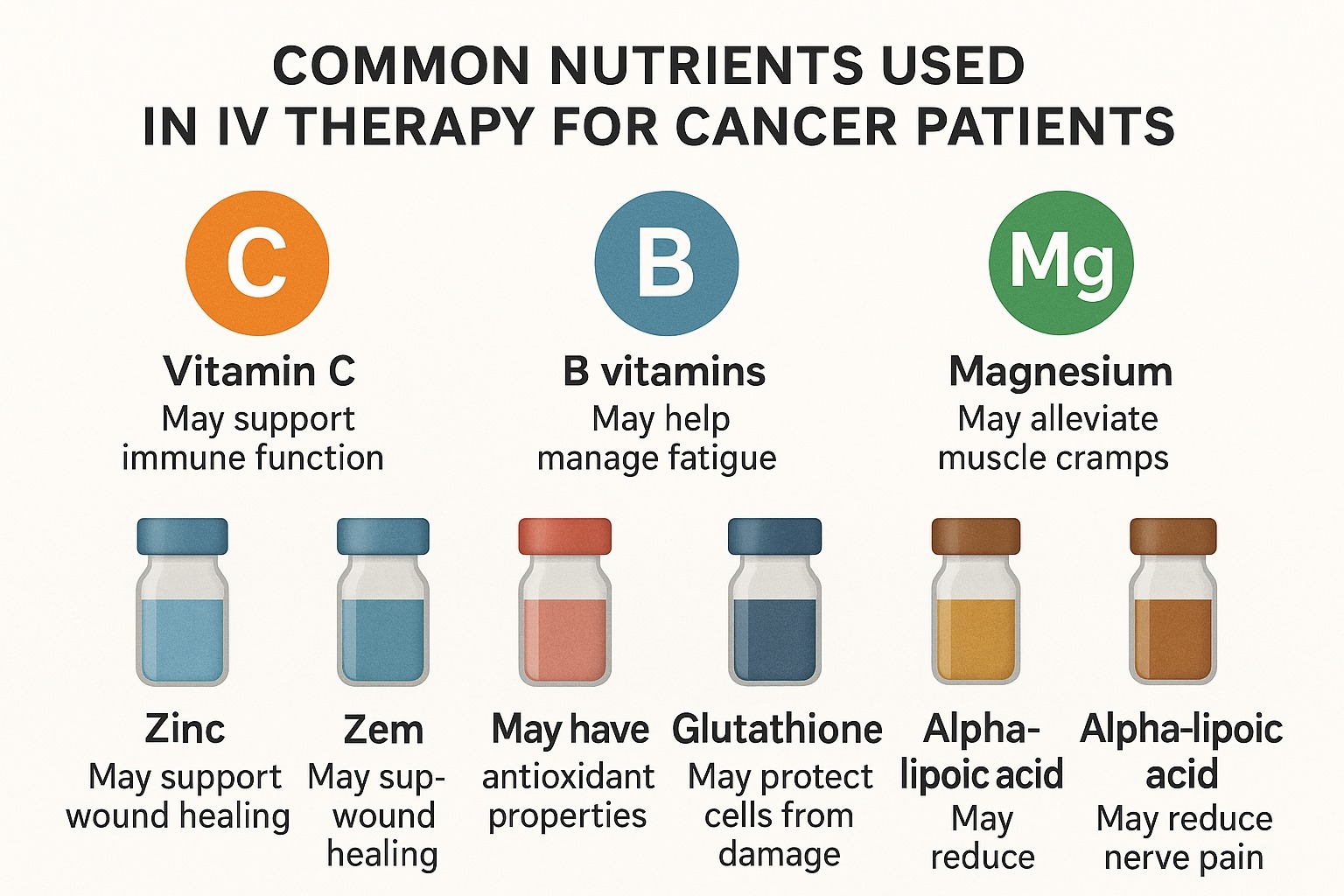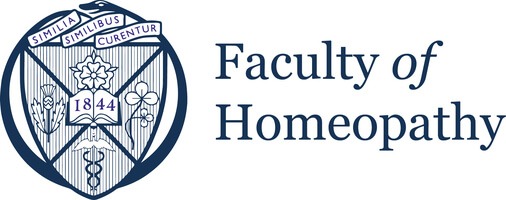Cancer treatment presents numerous challenges for patients, from the physical toll of conventional therapies to nutritional deficiencies that can develop during treatment. Many patients experience difficulty maintaining proper nutrition due to treatment side effects like nausea, decreased appetite, and altered taste sensations. IV nutrient therapy has emerged as a supportive approach within integrative cancer care, offering patients a way to receive essential nutrients directly into their bloodstream, bypassing digestive limitations.
As a specialist in Complementary Cancer Care with advanced training in Nutritional Medicine, I have witnessed how IV nutrient therapy can play an important role in supporting patients through their cancer journey when properly integrated with conventional treatments. This article explores the science, benefits, and practical applications of IV nutrient therapy specifically for cancer patients.
IV nutrient therapy delivers vitamins, minerals, amino acids, and other nutrients directly into the bloodstream through intravenous administration. This method differs significantly from standard medical IV treatments used in hospitals, which typically deliver medications, fluids, or blood products.
The fundamental advantage of IV nutrient therapy lies in its ability to achieve higher blood concentrations of nutrients than what oral supplementation can provide. When nutrients are taken orally, they must pass through the digestive system, where absorption can be limited by various factors including digestive capacity, intestinal health, and the presence of other foods. Many cancer patients experience compromised digestive function due to their treatment, making IV delivery particularly valuable.
Common nutrient combinations used in cancer support include:
These nutrients are carefully combined into individualized formulations based on a patient's specific needs, laboratory results, cancer type, and treatment regimen. The composition and dosage of IV nutrients must be precisely calculated to ensure safety and effectiveness.
A 2018 review in the Journal of Clinical Oncology reported that up to 80% of cancer patients use some form of complementary therapy alongside their conventional treatment, with nutritional approaches being among the most common. IV therapy represents one method of addressing nutritional needs when oral intake proves challenging.

Cancer patients often experience multiple nutritional challenges throughout their treatment journey. Research from Memorial Sloan Kettering Cancer Center has documented that nutritional deficiencies are common among cancer patients and can negatively impact treatment outcomes and quality of life.
Many cancer patients develop nutritional deficiencies due to:
IV nutrient therapy provides a direct route to replenish these deficiencies. A study published in the British Journal of Cancer found that correcting nutritional deficiencies in cancer patients was associated with better tolerance of treatment and improved quality of life scores.
The immune system plays a crucial role in cancer recovery. Multiple studies have documented how certain nutrients delivered intravenously can help support immune function during conventional treatments.
For example, zinc and selenium are essential minerals for immune cell function. Research published in the European Journal of Cancer showed that maintaining adequate levels of these minerals helped preserve natural killer cell activity—an important component of the immune system that targets cancer cells—during chemotherapy.
Vitamin C, when delivered intravenously at high doses, has been shown to have immune-modulating effects. A study from the University of Kansas Medical Center demonstrated that high-dose IV vitamin C increased the production of hydrogen peroxide in the extracellular fluid, which selectively damaged cancer cells while leaving normal cells unharmed.
Cancer treatments often produce challenging side effects that impact quality of life. IV nutrient therapy may help manage some of these effects:
Fatigue: B vitamins, magnesium, and amino acids delivered intravenously can help address fatigue, which affects up to 90% of cancer patients. A small clinical trial published in the Journal of Alternative and Complementary Medicine found that cancer patients receiving Myers' Cocktail (a specific IV nutrient formulation) twice weekly reported significant improvements in fatigue scores compared to those receiving standard care alone.
Neuropathy: Alpha-lipoic acid and B vitamins delivered intravenously have shown promise in addressing chemotherapy-induced peripheral neuropathy. Research from the Journal of Clinical Oncology documented improvements in neuropathic symptoms in patients receiving these nutrients via IV.
Tissue Damage: Some studies suggest that antioxidants like glutathione may help protect healthy tissues from damage during radiation or certain chemotherapy drugs. A controlled trial published in the Journal of Clinical Oncology found that IV glutathione reduced neurotoxicity in patients receiving cisplatin chemotherapy without interfering with treatment efficacy.
Many cancer patients struggle with profound fatigue and reduced energy that affects daily functioning. IV nutrient therapy aimed at supporting mitochondrial function—the cellular energy production centers—may help improve energy levels.
Research from the University of Miami Miller School of Medicine has shown that specific nutrients including carnitine, CoQ10, and B vitamins play crucial roles in mitochondrial energy production. When delivered intravenously, these nutrients reach the cells more efficiently and may help address cancer-related fatigue.
Dehydration represents a significant concern for many cancer patients, particularly those experiencing treatment side effects like vomiting and diarrhea. IV fluid delivery ensures proper hydration status, which supports overall physiological function and may help reduce certain treatment side effects.

The scientific understanding of IV nutrient therapy for cancer support continues to evolve, with several key nutrients showing promising results in research settings.
Perhaps the most extensively studied IV nutrient for cancer is high-dose vitamin C (HDIVC). While oral vitamin C reaches a plateau in blood concentration, IV administration can achieve levels 100-500 times higher, creating different biological effects.
At these pharmacological concentrations, IV vitamin C generates hydrogen peroxide in the extracellular space. Normal cells have robust mechanisms to neutralize this hydrogen peroxide, but cancer cells often lack these protective enzymes, making them vulnerable to oxidative damage.
Research from the National Cancer Institute has documented several potential mechanisms by which IV vitamin C may affect cancer cells:
Phase I clinical trials at medical institutions including the University of Iowa and Thomas Jefferson University have demonstrated safety and potential benefits when HDIVC is administered alongside standard chemotherapy for various cancer types.
Essential minerals play critical roles in cellular function, immune response, and protection against oxidative damage—all relevant factors for cancer patients.
Selenium has been shown to support immune function and may help reduce certain treatment side effects. A study published in the Journal of the American College of Nutrition found that cancer patients with higher selenium levels experienced fewer adverse events during treatment.
Zinc status affects multiple aspects of immune function. Research published in the Annals of Oncology demonstrated that maintaining adequate zinc levels supported better outcomes during treatment for specific cancer types.
Magnesium, commonly depleted by certain chemotherapy drugs, plays crucial roles in energy production, muscle function, and nerve transmission. Repleting magnesium intravenously has been shown to reduce certain chemotherapy side effects in studies published in the European Journal of Cancer.
Glutathione, often called the body's master antioxidant, plays essential roles in detoxification and cellular protection. Some chemotherapy drugs can deplete glutathione, potentially increasing toxicity to normal cells.
Research from multiple cancer centers has examined the role of IV glutathione in reducing specific chemotherapy side effects. A clinical trial published in the Journal of Clinical Oncology found that IV glutathione reduced neurotoxicity from platinum-based chemotherapy without interfering with treatment efficacy.
Several established IV nutrient protocols are commonly used in integrative oncology settings. These protocols must always be individualized based on the patient's specific situation and medical history.
HDIVC typically involves doses ranging from 15-100g administered over 1-3 hours, depending on the patient's weight, kidney function, and treatment goals. This therapy requires careful monitoring and should only be provided by professionals experienced with this approach.
Typically administered 1-3 times per week, HDIVC requires pre-screening for G6PD deficiency and careful timing around certain chemotherapy agents. The dosing, frequency and duration depend on the patient's clinical status and treatment goals.
The Myers' Cocktail, developed by Dr. John Myers and later modified by Dr. Alan Gaby, contains a balanced mixture of B vitamins, vitamin C, calcium, and magnesium. For cancer patients, this basic formulation is often adapted to include additional nutrients based on individual needs.
These modified Myers' formulations typically require 30-60 minutes for administration and may be scheduled around conventional treatments to help manage side effects and support quality of life.
IV glutathione may be administered alone or following other IV nutrients, particularly for patients experiencing significant side effects from treatment. The timing of glutathione relative to chemotherapy must be carefully considered, as some oncologists prefer separation between glutathione administration and certain chemotherapy drugs.
Specialized mineral infusions may be developed based on laboratory testing that identifies specific deficiencies. These formulations often include combinations of magnesium, zinc, selenium, and calcium tailored to individual needs.
The most effective IV nutrient protocols for cancer patients are individualized based on:
A study from the Block Center for Integrative Cancer Treatment published in the journal Integrative Cancer Therapies demonstrated better outcomes when IV nutrient therapies were customized based on comprehensive patient assessment rather than using standardized protocols.

The integration of IV nutrient therapy with conventional cancer treatment requires careful coordination and communication among all members of the healthcare team.
Timing of IV nutrients relative to chemotherapy, radiation, or surgery is critically important. Some nutrients may enhance certain treatments while potentially interfering with others.
For example:
The National Cancer Institute emphasizes the importance of communication between integrative practitioners and oncologists when planning complementary therapies. Research from MD Anderson Cancer Center has developed guidelines for timing of various complementary approaches relative to conventional treatments.
Successful integration requires open communication with your entire medical team. Many cancer centers now have integrative oncology departments that coordinate conventional and complementary approaches.
Prior to beginning IV nutrient therapy, patients should:
A survey published in the Journal of Clinical Oncology found that outcomes improved when patients had teams that communicated effectively about all aspects of their care, including complementary approaches.
The timing of IV nutrient therapy may vary based on treatment phase and individual needs. Common patterns include:
During Treatment: Many patients receive IV nutrients during chemotherapy or radiation to support energy, immune function, and manage side effects. In this context, the nutrients are carefully timed around treatment schedules.
Between Treatment Cycles: Some patients benefit from more intensive IV nutrient protocols during the recovery periods between chemotherapy cycles, when the body is working to rebuild healthy cells.
Post-Treatment Recovery: After completing conventional treatments, some patients continue IV nutrient therapy to support recovery, address accumulated deficiencies, and support overall wellness.
Preparation for Surgery: In the weeks before surgery, some protocols focus on optimizing nutritional status to support recovery, though most IV nutrients are paused immediately before surgical procedures.
Many patients report significant benefits from IV nutrient therapy as part of their cancer care plan. While individual responses vary, common patient reports include:
A female patient with stage 3 breast cancer undergoing chemotherapy reported: "The difference in how I felt during the weeks I received IV nutrients compared to when I didn't was remarkable. My energy improved, and I could actually participate in family activities rather than spending days in bed."
Another patient with colorectal cancer shared: "The neuropathy in my hands from chemotherapy was making daily tasks impossible. After we added specific nutrients to my IV protocol, the symptoms became manageable enough that I could continue treatment without dose reductions."
These anecdotal reports align with quality of life measurements in research studies. A prospective study published in the Journal of Alternative and Complementary Medicine found significant improvements in quality of life scores among cancer patients receiving integrative care that included IV nutrient therapy compared to matched controls receiving standard care alone.
IV nutrient therapy is not appropriate for every cancer patient. The decision to incorporate this approach should be based on careful assessment and discussion with qualified healthcare providers.
At Integrated Medicine, we conduct comprehensive evaluations before recommending IV nutrient therapy, including:
This multifaceted assessment helps determine whether IV nutrient therapy may benefit the individual patient and which specific protocols would be most appropriate.
IV nutrient therapy is not suitable for all patients. Contraindications include:
Research from the Society for Integrative Oncology emphasizes the importance of medical screening before initiating IV nutrient therapy to ensure safety.
The optimal approach varies based on:
Published guidelines from integrative oncology organizations recommend individualized approaches rather than standardized protocols for all cancer patients.
For cancer patients interested in exploring IV nutrient therapy as part of their integrative care plan, the process typically begins with a comprehensive consultation.
During your initial consultation, we will:
This thorough assessment enables us to determine if IV nutrient therapy might benefit your specific situation and how best to integrate it with your overall cancer care.
Based on your individual needs, we develop customized IV nutrient protocols. Treatment frequency varies depending on your:
Typical patterns include:
Treatment plans are regularly reassessed and adjusted based on your response and changing needs throughout your cancer journey.
IV nutrient therapy sessions at Integrated Medicine are designed to be comfortable and relaxing. During your session:
Most patients find the experience relaxing and report feeling energized afterward. The environment is designed to support healing with quiet spaces and minimal disruptions.
Regular follow-up is essential to monitor your response to therapy and make necessary adjustments. This includes:
Research from major integrative oncology centers has shown that this type of systematic monitoring and adjustment leads to better outcomes than fixed protocols.

IV nutrient therapy represents one component of a comprehensive integrative approach to cancer care. When appropriately selected, properly administered, and well-coordinated with conventional treatments, it may offer valuable support for many cancer patients.
The field continues to evolve as research expands our understanding of how specific nutrients interact with cancer cells and conventional treatments. The most promising approaches involve personalized protocols based on individual assessment rather than one-size-fits-all recommendations.
For cancer patients struggling with nutritional challenges, treatment side effects, or quality of life concerns, exploring IV nutrient therapy with qualified healthcare providers may provide valuable support during their cancer journey.
At Integrated Medicine, we remain committed to evidence-informed approaches that complement conventional cancer care while supporting each patient's overall wellness and quality of life.
If you are receiving cancer treatment or recovering from it and want to explore whether IV therapy could support your health, consultations are available through Integrated Medicine Clinic. Each session begins with a detailed review of your medical history, treatment goals, and any current symptoms.
Treatment plans are created only after understanding the whole picture—physical, emotional, and nutritional. This is a collaborative process, where your experience guides the pace and direction of care.
To schedule an appointment, visit: https://integratedmedicine.co/book-holistic-appointments/

Consultant in General Internal Medicine (GMC reg. number: 7541548) and Specialist in Complementary Cancer Care
MBBS, MRCIM (Spain), MSc Homeopathy, MFHom, Master practitioner in Ericksonian Hypnotherapy and Neurolinguistic Programming, MSc in Nutrition
Integrated medicine Doctor and Holistic Medicine Practitioner



